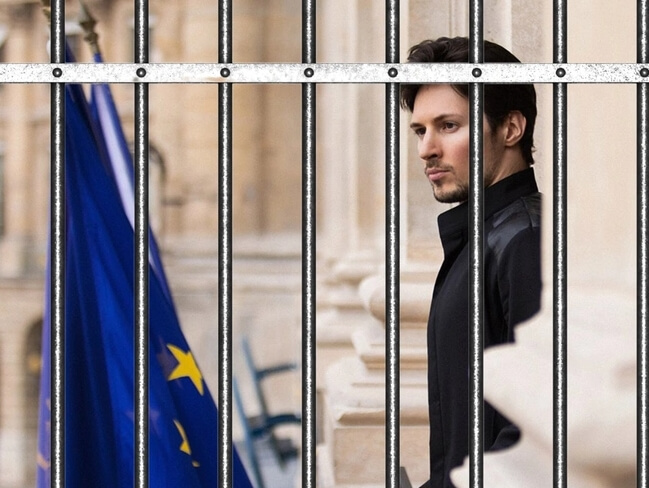Pavel Durov found himself at the center of a scandal that shocked the global tech community. The event in question is Durov’s arrest by French authorities on the evening of August 24, 2024, at Le Bourget airport in the suburbs of Paris. This news caused a wide resonance and led to significant fluctuations in the cryptocurrency market, particularly TON. The arrest of the well-known IT entrepreneur has become one of the most discussed topics in the industry recently. It has sparked numerous rumors and speculations about the reasons behind the incident and its potential consequences for Durov and the company he leads. What exactly is the creator of Telegram being accused of, and what is his position? How has this incident affected the TON cryptocurrency, and what are Telegram’s official representatives saying? Let’s delve into the details of this high-profile case.

- Reasons for the arrest
- Historical context
- What awaits Pavel Durov
- How the TON cryptocurrency reacted
- Official Telegram statements on the arrest
- Reactions from prominent figures
- Possible consequences
- Technical aspects
- International reaction
- Impact on users
- Economic consequences
- Technological debates
- Legal aspects
- The future of encryption
- Our thoughts
- Conclusion
Reasons for the arrest
French law enforcement accused Pavel Durov of complicity in drug trafficking, pedophilia, and fraud. The basis for the accusations was Telegram’s administration’s refusal to cooperate with French authorities in providing access to users’ encrypted messages. The investigation claims that Telegram’s encryption system was actively used by criminal elements to conceal their illegal activities. French television channel TF1 called Telegram the “number one platform for organized crime,” asserting that many accounts in the messenger are used by criminals due to the message encryption system that ensures anonymity. These accusations have sparked a heated debate about developers’ responsibility for their potential use in criminal activities. In response, Telegram commented on the situation, emphasizing that the messenger strictly complies with European Union laws, including the Digital Services Act. Representatives of the organization noted that content moderation in the messenger meets industry standards and is constantly being improved. However, this statement did not provide clear answers to questions about cooperation with law enforcement and access to encrypted data.
Historical context
It is worth noting that this is not the first time Pavel Durov has faced pressure from authorities. In 2014, he left Russia after a conflict with the authorities due to his refusal to provide VKontakte user data. This experience largely shaped his approach to privacy. Pavel’s case resembles other high-profile cases in the tech industry, such as the standoff between Apple and the FBI in 2016 over unlocking the iPhone of a terrorist. These cases demonstrate the growing tension between tech companies and government agencies on issues of security and privacy.
What awaits Pavel Durov
According to TF1, Pavel Durov, who holds French citizenship, faces up to 20 years in prison. The businessman could be held accountable as an accomplice to various crimes, including fraud, terrorism, money laundering, and child pornography. If these accusations are proven in court, the founder of Telegram faces one of the harshest punishments in the history of the IT industry.
The prosecution’s position is based on the claim that criminals used the message encryption system to maintain anonymity, while Durov refused to cooperate with authorities. However, the businessman’s defense insists on his innocence and calls the case politically motivated pressure on Telegram to gain control over the popular messenger.
How the TON cryptocurrency reacted
The news of Pavel Durov’s arrest led to a sharp drop in the Toncoin cryptocurrency, used in Telegram, and of which Durov is a co-founder. On the morning of August 25, the TON value fell by nearly 20%, dropping to $5.33 per coin. The sharp drop in Toncoin prices reflects investors’ concerns about the project’s future in light of the potential criminal prosecution of one of its key figures.
At one point, TON even fell out of the top 10 cryptocurrencies by market capitalization, dropping to 11th place. However, later, the cryptocurrency partially recovered its losses and, at the time of writing, was trading at $5.50, which is 18.4% lower than a day earlier. Analysts link the partial recovery in the price with statements from the TON community about the blockchain’s independence from Durov’s legal problems. Meanwhile, the rest of the cryptocurrency market remains “relatively stable,” as noted by Crypto Briefing. This indicates that investors see the situation around Pavel as a specific risk associated with TON rather than with the fundamental factors of the crypto market. Nevertheless, the further development of events around the founder of Telegram will inevitably influence Toncoin’s prices. The TON community has expressed support for Pavel Durov and stated that the blockchain project “remains strong and fully operational” despite the co-founder’s arrest. This statement is intended to reassure Toncoin holders and confirm the decentralized nature of the network, whose resilience does not depend on the actions of individual figures, even if they are its creators.
Official Telegram statements on the arrest
“It is absurd to claim that the platform or its owner is responsible for the platform’s misuse,” reads Telegram’s official statement. This thesis forms the basis of Durov’s defense position, which insists on the illegality of the charges and the political motivation behind the case. The official comments also emphasized that “almost a billion users worldwide use the messenger as a means of communication and a source of vital information.” The company strives to position itself as a global platform that plays an important social role and ensures freedom of communication for people worldwide. Representatives of the organization expressed hope for a quick resolution of the situation and the provision of all necessary clarifications to the French authorities.
At the same time, they made it clear that Telegram does not intend to compromise on data protection issues. The company also denied accusations that the platform or its owner bears responsibility for the service’s misuse by criminal elements. Telegram’s stance on this issue provokes mixed reactions. On the one hand, the company is right in pointing out that technologies are neutral and can be used for both good and evil. However, critics argue that developers should take more active steps to prevent the criminal use of their services.
Reactions from prominent figures
In response to the news, a number of influential figures expressed solidarity and support through social media. Among the most prominent voices were activist Robert F. Kennedy Jr., entrepreneur Elon Musk, and Rumble CEO Chris Pavlovski. Their comments mostly touched on the fundamentally important issues of freedom of speech and resistance to censorship. Kennedy emphasized the urgent need to defend the right to free expression of opinions, while Musk repeatedly called for Durov’s release from custody. Pavlovski, in turn, sharply criticized the actions of the French authorities, calling the arrest a blatant case of censorship. Renowned right-wing commentator Ian Miles Cheong described the situation as a direct attack on freedom of speech and an attempt to establish control over information flows. Durov’s supporters tend to see this incident as part of a larger problem related to internet freedom and the desire of governments to regulate online platforms. In their view, the arrest creates a dangerous precedent that could have far-reaching consequences for the future of the digital environment. Durov’s defenders call on the public to recognize the scale of the threat and to rally in support of fundamental rights and freedoms in the online space. They believe that only consolidated efforts from the global community can withstand the increasing pressure from authorities and defend the principles of an open and free internet.
Possible consequences
The arrest could have serious consequences for the messenger and the entire tech industry:
- The legal process will become key: Durov’s accusations and defense will be closely watched;
- Telegram’s operation could be disrupted, possibly leading to the appointment of interim management;
- Privacy issues will come to the forefront;
- Increased regulatory oversight is expected, with potential new attempts to regulate the platform;
- The fate of crypto projects, including Toncoin, could impact the cryptocurrency market as a whole;
- Content moderation rules will likely become stricter, especially if the arrest is linked to illegal activity on the platform;
- Long-term legal issues could raise questions about the ownership and management of Telegram;
- The debate over the role of tech organizations in ensuring national security and fighting crime could intensify;
- Other platforms with strong encryption (e.g., Signal, WhatsApp) may face increased pressure;
- Investors may reconsider their attitudes towards companies that adhere to strict privacy policies;
- New international agreements on regulating encrypted communications may emerge;
- This situation could be a turning point in relations between tech companies and governments, forcing a rethinking of the balance between security and privacy in the digital age.
Technical aspects
The messenger uses the MTProto protocol, developed by Durov’s team. This protocol provides end-to-end encryption for secret chats, theoretically making it impossible to access message content even for Telegram itself. However, critics argue that the use of a proprietary protocol rather than widely recognized standards could create vulnerabilities. This aspect could become key in discussions about Telegram’s security in the context of current accusations.
International reaction
Pavel’s arrest has sparked reactions not only in the tech community but also on an international level:
- Human rights organizations such as Amnesty International and the Electronic Frontier Foundation have expressed concern about a possible violation of the right to privacy;
- Some governments, especially those that have previously criticized Telegram for its refusal to cooperate, welcomed the actions of French authorities;
The UN called for a balance between national security and human rights in the digital age.
Impact on users
Millions of people worldwide are concerned about possible changes in the app’s operation:
- Some began searching for alternative platforms, fearing potential data compromises;
- Activists and journalists, especially in countries with authoritarian regimes, expressed concern about the possible loss of a secure communication channel;
- At the same time, many expressed support for Durov, organizing online campaigns and petitions;
- Some business users who relied on Telegram for communication and marketing began considering contingency plans.
Economic consequences
The situation could have serious economic consequences:
- Investors in cryptocurrency projects associated with Telegram may reconsider their positions;
- Those who provide services based on the Telegram platform will face uncertainty about their future;
- There may be a decline in confidence in cryptocurrency projects linked to messengers and social networks.
Technological debates
The precedent has sparked widespread debates in the tech community:
- Discussions revolve around the balance between user security and national security;
- The need for international standards for data exchange is becoming more relevant;
- The role of tech companies in fighting crime and their responsibility for content on their platforms is being debated.
Legal aspects
Durov’s case raises complex legal questions:
- Given Telegram’s global nature, questions arise about which country has the right to judge Pavel;
- If he leaves France, complex extradition negotiations will ensue;
- The outcome of Durov’s case could set an important legal precedent for future cases involving tech companies.
The future of encryption
The arrest could have far-reaching consequences:
- Increased pressure on platforms to create “backdoors” in their systems is possible;
- Interest in decentralized communication systems that do not depend on a single person may grow;
- Investment in developing new encryption methods resistant to government interference is likely to increase.
Our thoughts
The arrest of Pavel Durov has become one of the most high-profile events in the global IT industry in recent times. It once again raises the question of choosing between privacy on the one hand and cooperation between tech companies and law enforcement on the other. This balance is becoming increasingly important in the era of total digitalization and the growing influence of IT giants.
Many experts see the actions of French authorities as an attempt to pressure Telegram to gain access to data. Pavel has repeatedly stated the inadmissibility of providing “backdoors” to the messenger for special services or other government bodies, considering this a violation of users’ freedom and privacy. However, critics point out that absolute secrecy can create grounds for criminal activity and hinder investigations. The development of the situation around the arrest of the founder of Telegram will have significant consequences not only for the messenger itself but for the entire industry as a whole. The behavior of the French authorities could create a dangerous precedent and provoke similar actions in other countries against companies defending end-to-end encryption principles. On the other hand, Durov’s firm stance and support from the international IT community could strengthen Telegram’s status as a symbol of free internet (#FreeDurov)
At the same time, the arrest highlighted the problem of organized crime using encrypted services. It is clear that technologies, despite their importance for ensuring freedom and privacy, can also be used for illegal purposes. Finding a reasonable balance between privacy and security will become one of the key challenges for the IT industry in the coming years.
Conclusion
Pavel Durov’s arrest is not just news in the tech world but an event that could change the landscape of digital privacy and communications. It raises important questions about the boundary between security and privacy, the role of tech platforms in the modern world, and the limits of state control over digital platforms. The fate of Pavel Durov and the further development of events around Telegram are of great interest to the global community. The outcome of this confrontation will largely determine the future of encryption technologies and freedom of communication on the internet. One can only hope that common sense will prevail in the end, and the parties will be able to find a mutually acceptable solution without compromising fundamental rights and freedoms.
While Pavel’s fate remains uncertain, one thing is clear: this case will set a precedent that will influence the development of technology and legislation in the field of digital communications for years to come. The global community will closely monitor the development of this case, the results of which will determine the future of the internet and digital freedoms on a global scale.






